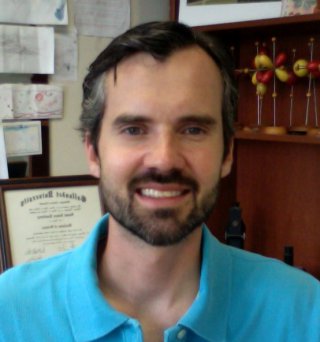You are here
Dr. Daniel Lundberg

1. The basics: hometown, current city
I grew up in Lakeville, Minn.—a southern suburb in the Twin Cities area. I currently live in both Lake Shore, Minn., and Washington, D.C.
2. Do you identify as deaf, hard of hearing or another term?
I identify myself as Deaf.
3. Your educational background: mainstream/school for the deaf; high school; college and major; graduate/medical school and major; additional training/education
I was mainstreamed from K-12th grade (K-6th grade at Gideon Pond Elementary in Burnsville, Minn., 7th-8th grade at McGuire Junior High in Lakeville, and 9th-12th grade at Lakeville Senior High). I attended Gallaudet University and received my BS in Biology. A one-year post-baccalaureate fellowship at the National Cancer Institute in Bethesda, Maryland followed. I then returned to Minnesota to complete my Pharmacology PhD at the University of Minnesota-Twin Cities Medical School.
4. What about your field interests you the most?
I find it fascinating that things at the microscopic, even atomic, levels have profound impacts on the human body and the environment. And how subtle changes in the composition and structure of atomic arrangements have drastic impacts on our body and the environment. Many times, the answer to a scientific question leads to new questions, continuing the exciting work of finding answers to scientific problems.
5. What barriers did you encounter in your education?
A major barrier that I encountered in my education and still encounter to this day is qualified interpreters. Scientific terminology is like an entirely different language to the layperson and many science words do not have an established sign, requiring intensive fingerspelling. This is a nightmare scenario for many interpreters as long and complicated vocabulary are constantly being fingerspelled in scientific conversations and presentations.
Also, interpreters cannot be provided 24/7 in the laboratory as most of the time is independent work, collecting data and generating results. There is the occasional “water cooler” talk among colleagues in the laboratory and without an interpreter, I cannot have this conversation interpreted. This, at times, makes it feel lonely in the laboratory.
6. How did you overcome those barriers?
At the University of Minnesota Medical School, I was fortunate to have a great team of interpreters. Before I started my PhD education, I met with the entire group of interpreters that worked at the U of M and talked about my research interests. This allowed me to interact with these interpreters and gauge their skills and ability to understand me. I then was asked to create several different teams of three interpreters, starting with my “Core” team—the best group of interpreters for me, followed by my “first back up team”, “second back up team”, and so on. As I completed my PhD education in 5 years, some of the interpreters there during my first year eventually found different jobs away from the University and some new interpreters started working at the University in the latter stages of my PhD education, making this a dynamic process. Some interpreters that initially were in my “first back up team” were “promoted” to my “Core team”. These interpreters were excellent—they enjoyed the sciences and were not intimidated by the sciences, learning as they interpreted. It’s unfortunate that they didn’t get an honorary degree as they were in every class and learned with me!
And in the laboratory, when an interpreter is not present, I would communicate via paper and pen, MS Word, pager, whiteboard, and gestures. Some of my University of Minnesota colleagues (during my graduate school days) learned ASL. I made sure I didn’t ask what was going on every time I saw a group of people get together for the “water cooler” talk as I didn’t want to be seen as an intrusive burden. I allowed these conversations to flow naturally and would find the right time to walk in and get updated, or ask a colleague what went on later in the day. Flexibility and patience is absolutely essential.
When I go to scientific conferences where I do not give a major presentation, I ask the organizers to provide a captioner and an interpreter. The captioner will type what is being said during the presentations and for prep time, they usually feed the terminology from the presenters’ publications into the captioning device so it’s easier to caption during the talks. It’s not error-free as many misspelled words or different words may be typed, but it’s better than fingerspelling new terminology with limited prep time. And when it comes to social hours or times to interact with others, I will use the interpreter as it’s more natural in a social setting.
7. What advice would you give to others interested in pursuing a career in the science field?
The sky is your limit! Never cease to be amazed at what humankind has accomplished to this day and what can be done in the future—how travel across the globe and into space is now a reality, intelligent computers, and how medical drugs work on our anatomy and physiology to cure/alleviate disorders and illnesses—to name a few! Do not be intimidated by all the formulas and numbers used in science, treat them as your tools in your toolbox—they are what helps you think creatively and solve problems.